Institutional Context
Summary
Since its foundation in 1964, Lancaster University’s institutional strategy has placed equivalence on research, education and engagement and this three-pillar approach remains today. Consistently ranked in the top 15 UK HEIs and highly ranked globally, Lancaster translates deep local and regional impact that can be applied for wider national and international contexts – acting locally and thinking globally. Lancaster uses its reputation as a research-intensive institution to hold a respected position as an innovative and effective catalyst for change. Lancaster focuses on key societal challenges and specialises in multi- and inter-disciplinary innovative engagement. As an anchor institution, Lancaster is an active enabler for securing opportunities that benefit its various communities by prioritising quality and effectiveness of its solutions over quantity.
Institutional context
Lancaster University contributes to societal, cultural, environmental and economic development at local, national and global levels, engaging actively with partners to support innovation through knowledge exchange (KE). Our Strategic Plan has Engagement as an equal pillar alongside Research and Education. Its purpose is “to engage actively with our community of communities (from local to national to global), to use our collective intellectual and wider capabilities to act as a ‘force for good’ - a facilitator that generates widespread and transformative economic and societal benefit.”
Through KE, we engage with partners and stakeholders across businesses (large and small), entrepreneurs, public and third sectors and policymakers. We build innovative collaborations to meet the challenges of modern society and stimulate research and teaching, both in the UK and through our global strategic partnerships in Malaysia, Ghana, Germany and China. By focusing on synergies across research, teaching, innovation, enterprise and leadership, we can be a key catalyst in positioning the North West of England as a beacon for positive economic, health, social, environmental and educational change and in doing so meet our responsibilities as a civic university.
Key focus areas include:
Working with regional partners to enable economic growth within Lancashire and the North West. This includes delivery of business innovation collaboration programmes worth >£100M focussed on key local, regional and national challenges including healthcare, net zero, entrepreneurial leadership and the secure digital/data driven economy. We are an active member of the N8 group of northern universities, hold seats on the North West Business Leadership Team (NWBLT) and have developed strategic alliances with local authority, university, college and industrial partners.
Capitalising on the full potential of flagship opportunities. This includes Eden Project Morecambe in partnership with Lancaster City Council, the Lancashire Local Enterprise Partnership (LEP), County Council (LCC) and the Eden Project, which was recently awarded £50M through the Levelling Up Fund. We also played a pivotal role in partnership with the LEP, BAE Systems, LCC and University of Central Lancashire, working with the Ministry of Defence to secure the location for the new National Cyber Force representing investment of £5Bn by Government.
Co-location of almost 50 organisations in dedicated office and laboratory spaces across our campus, enabling close physical proximity to researchers and KE staff resulting in deep and sustained collaborations. We are now developing policies to enable the creation of a full Innovation Campus.
We are one of four universities who partner with the Open Innovation Partnership, we are members of The Universities Policy Engagement Network (UPEN) and we proactively engage with the Industry and Parliament Trust to build relationships between researchers and Government and influence policy development. The Work Foundation, the leading think tank for improving work in the UK, further enables our KE with policymakers.
We are proud of our extensive use of undergraduate and graduate talent to enable KE collaborations, enhance employability, retain expertise regionally and support our broader research environment. We reward academic KE activity through an Engagement pathway for academic promotions and annual staff awards.
For further information, please send queries to KEF@lancaster.ac.uk
Local Growth and Regeneration
Summary of approach
Lancaster University’s vision of being a globally significant university is consistent with our civic responsibility as a local anchor institution focussed on facilitating regional economic, cultural and societal change. Partnership is core to Lancaster University’s ethos and our industrial hinterland has driven our focus on collaboration with regional Small and Medium Sized Enterprises (SMEs). We engage with partners to support innovation through Knowledge Exchange collaborations that are mutually beneficial. Our Strategic Plan reinforces our commitment to being “
a key catalyst in positioning the North West as a beacon for positive economic, health, social and educational change” and we demonstrate this through strategic partnerships on regionally transformational projects including Eden Project Morecambe and the National Cyber Force.Aspect 1: Strategy
Lancaster University’s approach to local growth is tailored to support Small and Medium Sized Enterprises (SMEs) in the region. Unusually for a top 15-ranked, research-intensive university, this approach was a deliberate decision to focus on connecting our academic strengths in alignment with the structure of our region and the needs of our local economies, supporting the development of innovative supply chains for key sectors including aerospace, cyber security and energy. This SME-centred strategy has delivered benefits beyond the region, with positive and measurable impacts across the UK, Europe, Africa and Asia – for example utilising our innovation collaboration programme models to develop partnerships through our overseas campus in Leipzig.
By becoming ‘business as usual’, this approach has allowed us to harness our undergraduate and graduate talent to provide the necessary absorptive capacity to facilitate these collaborations, whilst enhancing graduate employability and retention in our region. This is key to our strategic approach and essential to the locality, given productivity in both Lancashire and Cumbria is approximately 15-20% below the UK average (https://tinyurl.com/mrmnm6rt), caused by, and in turn compounding, a legacy of skills gaps in key sectors and relatively low levels of innovation. SMEs account for 99.7% of all businesses in those two counties. In Cumbria, SMEs that employ fewer than 50 people constitute >98% of all businesses (https://tinyurl.com/2p86yenc) and over 75% of all businesses in Lancashire employ fewer than 4 people (https://tinyurl.com/uwyhk8fe). This means that SME growth and sustainability have a major impact on regional employment and prosperity.
Lancaster University began deep and broad engagement with its local SME community in 1998, following an initial £200,000 European Regional Development Fund (ERDF) grant to support 40 Lancashire-based businesses. Lancaster is now recognised as a national exemplar in driving SME innovation-led growth. We have supported almost 15,000 SMEs, creating/safeguarding more than almost 18,000 jobs, thereby achieving significant economic and social impact regionally and nationally.
Our 2021-2026 Strategic Plan is clear that we will work with existing and new partners for the benefit of the wider Lancashire region and the UK building strong communities and exploring the potential to develop this model for engagement internationally. In doing so, we will realise the full potential of flagship opportunities to enable researchers, businesses, local authorities and policy-makers to advance local and national thinking, planning and implementation of transformative opportunities.
We contribute to regional economic growth within Lancashire and broader Local Enterprise Partnerships (LEPs) across the North, working with regional HEI partners through a series of business innovation collaboration programmes now worth >£100M supported largely through European Structural and Investment Funds (ESIF). These are focussed on key local, regional and national priority areas and challenges including productivity (particularly in SMEs), healthcare challenges (focused on rural populations in Lancashire-Cumbria and our coastal regions), leadership and management, the move towards net zero and an increasing focus on a secure digital/data driven economy.
These innovation collaboration programmes directly contribute to levelling-up priorities Since 2016, they have supported over 2,500 SMEs and created over 450 jobs with the potential to increase to over 3,000 SMEs and in excess of 600 jobs when these projects finish later in 2023.
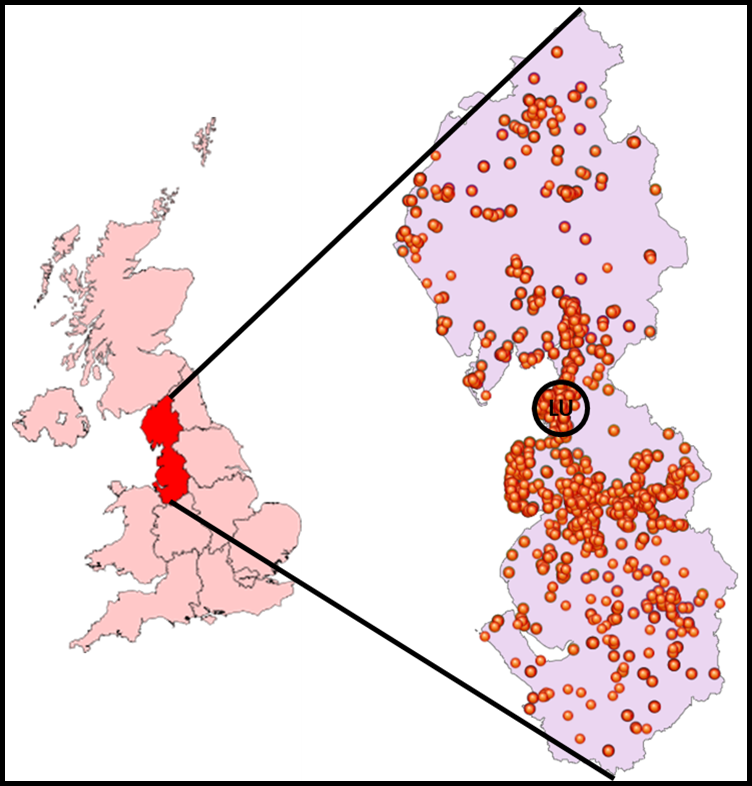
Figure 1 - Locations of SMEs supported through Lancaster University’s regional business innovation collaboration programmes 2016-2022 across the North West (LU = geographical position of the university)
Aspect 2: Activity
Lancaster University collaborates with all five North West LEPs to ensure activities align to their economic, skills and innovation related plans. We have held a seat on key Lancashire LEP Boards and the North West Business Leadership Team (NWBLT) and are an active member of the N8 partnership, a collaboration of the eight most research intensive Universities in the North of England. We have developed strategic alliances with local authority, HEI, FE college and industrial partners, and we have confirmed our commitment to our local communities through the Civic University Network.
Specific examples of our activities include:
Lancashire Universities Innovation Manager (LUIM)
The LUIM role was created in partnership with the universities of Central Lancashire and Edge Hill to enable a more strategic approach to our collaboration with the Lancashire LEP. Initiatives include:
Creation of an Innovation Framework to help guide the universities to align their regional activities with the emerging LEP strategy;
Research and policy guidance for economic development strategies, alongside Lancashire LEP, Lancashire County Council (LCC) and the Department for Business, Energy and Industrial Strategy (BEIS). This included the creation of an Innovation Board in 2020 on which Lancaster represents the Lancashire universities and a new Innovation Strategy launched in 2022;
Influencing wider innovation policy through input to the NP11 Innovation Group (representing all of the Northern LEPs) to develop a Northern Challenge Fund to level R&D spend towards the North with priorities for Clean Growth and Health Innovation;
Leading the collaboration between Lancashire, Cheshire and Cumbria LEPs to develop joint strategies on Clean Growth and on leading the national ‘green recovery’ from the North West through the Massachusetts Institute of Technology Regional Entrepreneurial Acceleration Programme (MIT-REAP). We were one of only six regions invited to participate in the new national pilot sponsored by BEIS and focused on the stimulation of place-based innovation ecosystems. Building from the evidence base of our Science and Innovation Audit focused on Clean and Sustainable Growth, our team have focused on the development of proposals that nurture a North West ‘green recovery’, including SME innovation support programmes, a clean-tech accelerator network and aligned net-zero focused investment funding.
Flagship Opportunities – Net Zero
The Centre for Global Eco-innovation (CGE) led by the Lancaster Environment Centre (LEC) is represents a nationally leading initiative in SME partnership-working for sustainable innovation and clean growth. It is now established as a designated multi-disciplinary university research centre. Eco-I North West is a £14M programme delivered by CGE that is working with more than 360 businesses across Lancashire, Liverpool City Region, Cumbria, Cheshire and Greater Manchester to support R&D-led innovation in clean growth technologies, products and services to drive a green economic recovery. Collaboration with five North West (NW) based universities ensures businesses across the NW are capitalising on the region’s knowledge base and research talent through supporting 70 PhD and MRes studentships. The original three year CGE programme saved 27,000 tonnes CO2 equivalent, 78,000 tonnes of water use and 60,000 of materials use.
Lancaster University supported a successful £50M Levelling Up Fund bid for Eden Project Morecambe – EPM (the largest investment possible) led by Lancaster City Council in partnership with the Lancashire LEP, LCC and the Eden Project. EPM will significantly regenerate the area, create over 2000 new jobs (directly and indirectly), bring an estimated 740,000 visitors to the area annually and enable multiple opportunities for KE and research. The partnership with the Eden Project already established the Morecambe Bay Curriculum in 2020, a unique pre-natal to 25 years curriculum that promotes green, practical pathways to learning in the natural environment of the Bay. There are more than 50 partners involved including nurseries, primary schools, secondary schools, colleges, universities and representation from the public, private, health and third sectors.

Figure 2 - Proposed Eden Project Morecambe Site
Flagship Opportunities – Security and Protection Science
Lancaster University is the lead academic partner in the new Manchester Digital Innovation and Security Hub (DiSH). Led by Barclays Eagle Labs, and partnered with Plexal and Manchester University, DiSH is a place for collaboration between Manchester's business and entrepreneurial community, leading academics, public sector organisations and the voluntary sector to identify digital security threats and provide innovative responses to them. The hub offers co-working space as well as access to state-of-the-art equipment and facilities, allowing business residents to develop and test their products and services rapidly. The DiSH is located in an 11,000ft2 state-of the-art space in Manchester city centre, together with GCHQ and the National Cyber Security Centre (NCSC). The facility builds on our NCSC recognition as an Academic Centre of Excellence in both Cyber Security Education and Research, successful delivery of two SME innovation support programmes in Lancashire and Manchester that use cyber security practices to enable business growth, and our Secure Digitalisation Enterprise Zone.
Lancaster was also part of a Lancashire-wide partnership of key anchor organisations, namely the LEP, BAE Systems, LCC and the University of Central Lancashire (UCLan), working with the Ministry of Defence and GCHQ to ultimately secure the location for the new National Cyber Force (NCF) in Samlesbury. This inward investment of £5Bn by Government to create a capability of up to 3,000 cyber specialists represents a transformational levelling-up opportunity for Lancashire. Lancaster’s cross-institutional strengths across cyber and security were described as ‘pivotal’ to the decision to locate the NCF in Lancashire.
The Lancashire Cyber Alliance was recently launched, supported by the LEP and Digital Skills Partnership. It is a spoke of the North West Cyber Security Cluster (NWCSC), which provides a voice for the region and is affiliated with the UK Cyber Cluster Collaboration (UKC3). It is the ambition of Lancaster and partners to create a North West “cyber corridor” from Manchester to Lancaster and beyond.

Figure 3 - Collaborative Working Space at the DiSH
Deepening Relationships and Creating Clusters
Lancaster has recently focused on deepening relationships with Local Authorities across Lancashire and Cumbria; building on established partnerships with regional HEIs (such as UCLan, Edge Hill University – EHU and University of Cumbria – UoC) and using our Community Renewal Fund (CRF) projects as a pilot for activities funded through future UK Shared Prosperity Funding (UKSPF), the successor to ESIF. Our CRF projects focussed on creating place-based clusters of key stakeholder organisations (from across private and public sector, HE and Further Education), to develop localised innovation ecosystem collaborations leading to an increase in the proportion of Innovation Driven Enterprises (IDEs) across our region. This is our Innovation Catalyst approach developed by academic expertise from our Management School (LUMS).
Working with a range of organisations in Blackpool, we explored opportunities to create an innovative digital sector, built around a cluster of ethically powered data centres, which operate on renewable energy and redistribute excess energy into social heat networks using ground-breaking green technologies. Working with broader organisations across wider Lancashire, we set out to build resilient, sustainable innovation ecosystems in the manufacturing and engineering sectors; particularly focussing on challenges posed by the net carbon zero agenda and cyber security threats. We engaged with almost 180 organisations through these Innovation Catalysts, creating a platform for sustained collaborations and follow on activity has already started to emerge, in particular from Blackpool, where collaborative Innovate UK proposals are being developed.
Through these activities, we have supported the emergence of a business-led Electech Innovation Cluster across the Morecambe Bay region which comprises a range of SMEs led by highly motivated, entrepreneurial individuals with a strong connection and commitment to their place and the role of University as an innovation anchor and talent pipeline. The Cluster, which we have joined, is already attracting interest from InnovateUK and the NWBLT as a key emergent regional innovation cluster.
Aspect 3: Results
In 2019, Lancaster University commissioned an independent economic evaluation of our business innovation collaboration programmes funded through European Structural and Investment Funds (ESIF). Almost 200 SMEs were surveyed to assess the impact of the support they had received from the University. The evaluation provided us with an independent assessment of our work, whether our offer was fit for purpose and represented perceived and measurable value for both beneficiaries and funders. The forecasted impacts to December 2023, cumulative across all programmes and individual SME level are shown in Table 1.

The evaluation also examined the beneficiary experiences as well as the economic impacts and 99% agreed delivery approaches were fit for purpose. Beneficiaries were asked what the biggest impact of participation had been on their business, in their own words. Common responses focused on benefits arising from ‘networking’, ‘peer support’, ‘increased confidence’ as well as via securing ‘support and advice’ and ‘new knowledge’.

Figure 4 - Impacts Reported by Regional SMEs participating in Lancaster Business Innovation Collaboration Programmes
The evaluation also asked SMEs to consider emerging themes how delivery could be improved for future programmes. This is important not only to inform Lancaster’s own activity, but also ESIF-successor funding schemes such as UK Shared Prosperity Fund. This helps to ensure Lancaster University further evolves our role as a regional anchor institution to impact positively on local growth and regeneration across Lancashire, the wider North West and beyond.
Direct quotes from participants in these programmes appear below and show the wide range of positive effects experienced as a result of collaborating with Lancaster University.

We have continued to use independent external evaluation for Community Renewal Fund (CRF) projects delivered more recently during 2022. The Blackpool Innovation Catalyst focused on the concept of green data centres that also help level up the area by making a substantial contribution to the net zero agenda and employment growth. Blackpool was seen as having an advantage in this area due to the international fibre network connecting the United States to mainland Europe, which enters the UK in Blackpool, and the high levels of power generation in the North West, which makes Blackpool an ideal location for data centres and green power generation. A survey of participants found the Innovation Catalyst:
has addressed the needs and opportunities facing Blackpool;
has been successful in bringing appropriate partners together to support the regeneration of Blackpool;
has the potential to lead to public and private sector investment in Blackpool;
has the potential to lead to the growth of a digital cluster in and around Blackpool;
has the potential to lead to Blackpool becoming a demonstrator location for re-using heat from data centres;
has the potential to lead to Blackpool becoming a strong location with regard to the growth of renewable energy technologies;
has the potential to lead to an improved image of Blackpool.
Figure 5 shows a Graphic Recording undertaken by an external illustrator at the final collaboratory event, where delegates review and reflect on the activity to date. It creates focus for next steps and actions required to take things forward, identifying additional stakeholders who would be instrumental in enacting the new actions. A larger version of the image is available here.
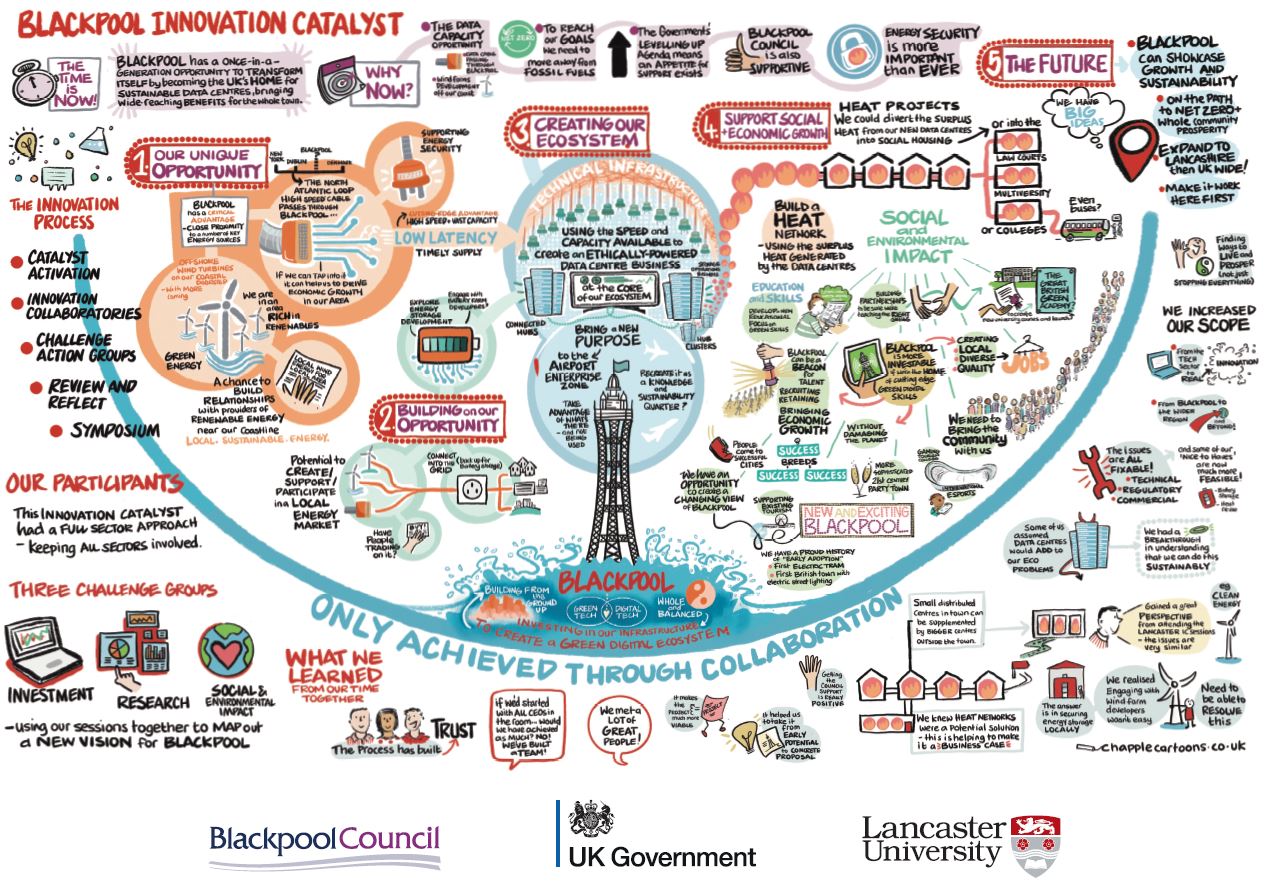
Figure 5 - Graphic Recording of the Blackpool Innovation Catalyst Project showing activities undertaken, learning and next steps agreed by participants
Public & Community Engagement
Summary of approach
Lancaster University is committed to being a force for good and creating positive economic, cultural, societal and environmental change. Our latest strategic plan places equivalence on engagement, education and research. Our values of respecting each other, building strong communities and creating positive change underpin our long-held commitment to civic, public and community engagement.
We are embedded within a full range of regional, national and international communities whilst participating in, and driving, sustainable regional growth and development. We build innovative, interdependent relationships with key partners and civic leaders to understand needs and contribute expertise and resources. We support public and community engagement related to, and driven by, research and education; and we facilitate community access to our facilities and cultural assets.
Aspect 1: Strategy
Lancaster is a top 15 research-intensive University in a region encompassing urban, rural and coastal communities, and with global strategic partnerships in Malaysia, Ghana, Germany and China. Committed to being a force for good and creating positive economic, cultural, societal and environmental change, we have three priority strategic themes for our place-based engagement encompassing our regional and global communities: inclusive economic growth and major infrastructure projects, developing a regional skills ‘ladder of opportunity’, and developing the role of our overseas campuses in their local places.
The University’s stakeholder groups have been identified through consultation within the University and include regional, national and international organisations across business, arts, health, policy, civic and education related sectors.
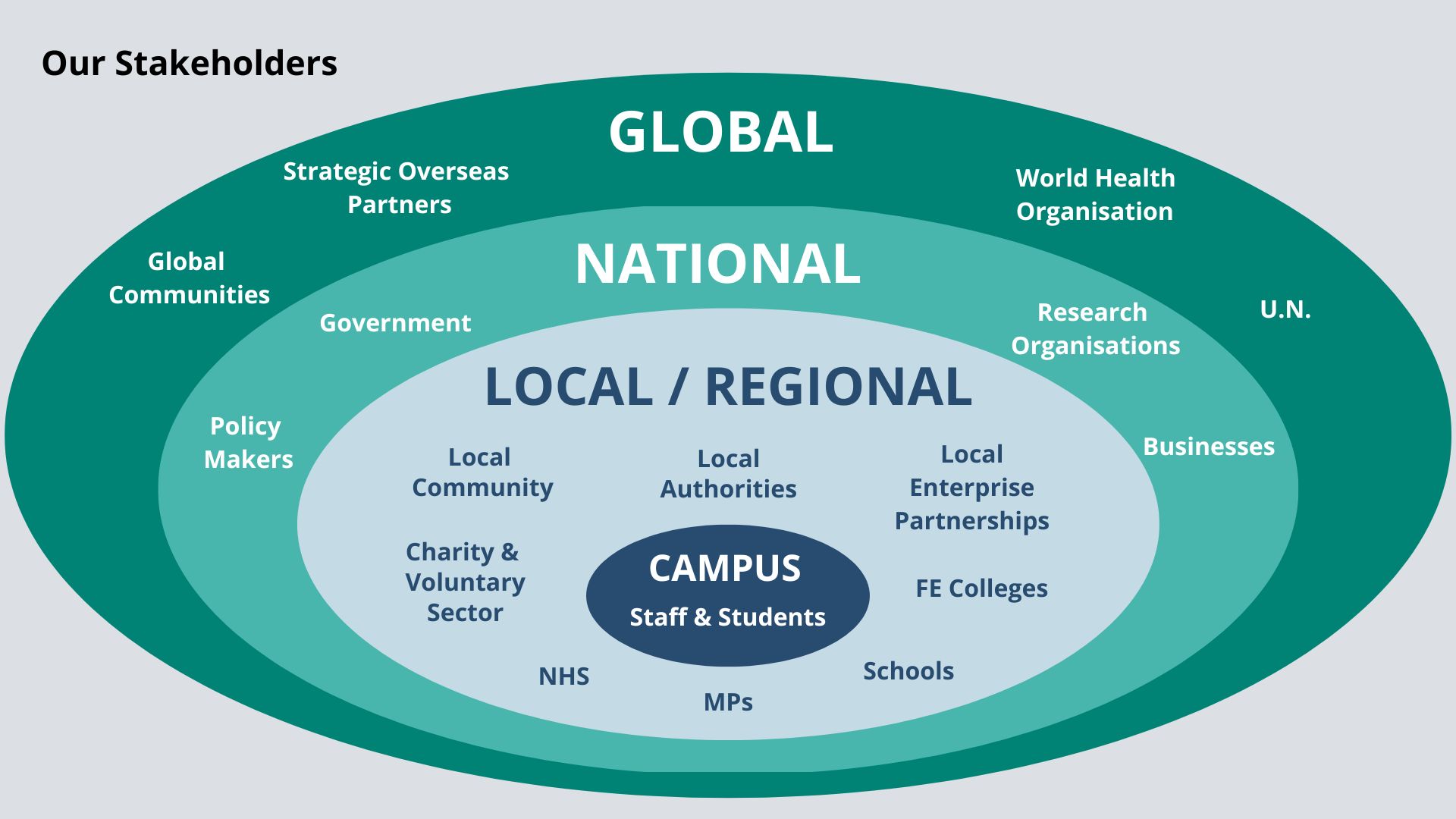
We take a stakeholder-informed approach to engagement through:
Community and stakeholder views gathered via market research, the annual Lancaster Exchange and events and meetings
Trusted relationships with partner organisations, underpinned by shared aims set in formal Agreements
Staff input gathered via departmental and faculty engagement strategies and ‘Big Conversations’ on topics including sustainability, our values, and our civic role
Student representatives embedded in key committees
Staff representation on a range of external bodies, including NHS Trusts, Chambers of Commerce, Schools, FE Colleges, and third sector organisations, resulting in stronger relationships and a better understanding of local needs.
Public and community engagement (PCE) is embedded in the University’s strategic plan, published in 2021 following widespread consultation with staff, stakeholders and the local community:
Research that transforms practice and thinking … driving forward research quality and impact through our public engagement activities.
Engage actively with our communities and partners to co-create positive … change, and to inform and stimulate our research and teaching.
PCE is also incorporated in Knowledge Exchange (KE) strategies and plans, including the HEIF Accountability Statement to 2024/5 and the KE Concordat Action Plan. In 2021-22 investment was agreed to build capacity to develop and embed an institutional approach to Civic, Public and Community Engagement. Priority activities include:
Building a PCE implementation strategy, including expert advice, evaluation, training; equality, diversity and inclusion (EDI); and continuous improvement;
Meeting our responsibilities as a civic university through increased engagement with civic stakeholders and developing partnership agreements
Delivery of the PCE programme
Supporting community use of University facilities.
The Pro-Vice-Chancellor Engagement (PVC-E) and Associate Dean for Enterprise and Engagement (ADEE) formally lead institutional engagement. The infographic shows how this leadership is supported and embedded across the University.
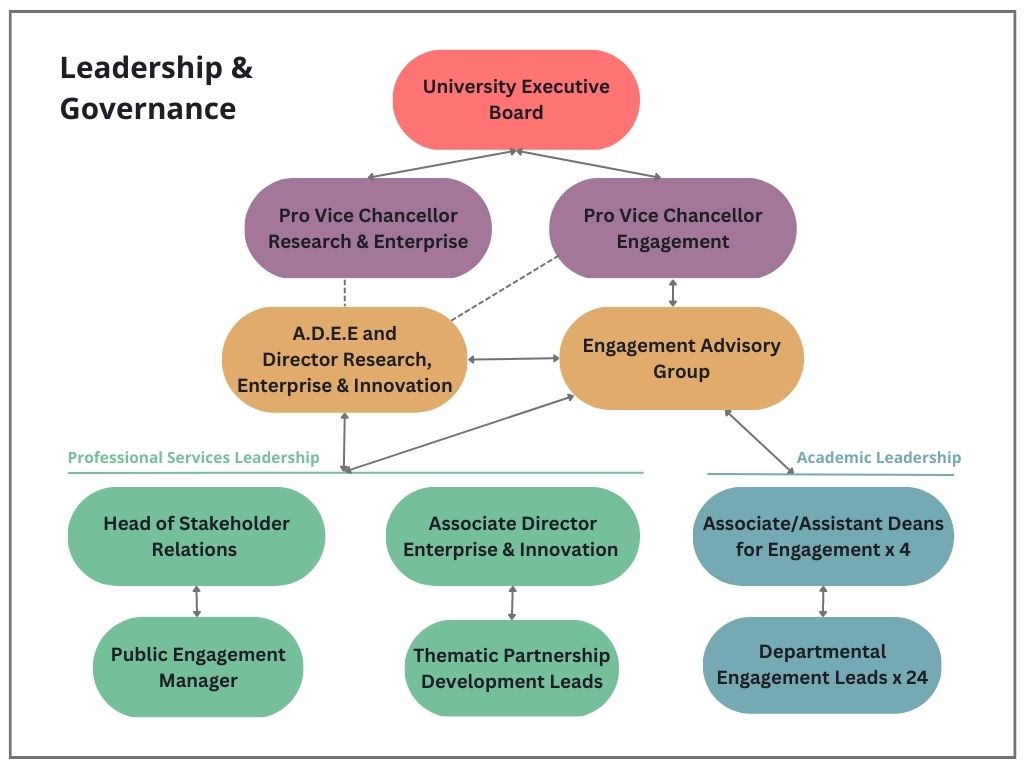
In support of our civic and PCE activity, a range of external funding has been awarded including:
Over £19.5m of highly competitive grants for research projects since 2018 including Beyond Imagination E3, Future Places, H-Unique and GREAT, all embedding public engagement from local to global levels
Public investment leveraged for Lancashire (£5bn National Cyber Force, £50m Eden Project Morecambe)
c. £1.8m ESRC and AHRC Impact Acceleration Accounts supporting engagement with the social sciences and arts and humanities
HEIF investment to support the development of Community and Business Partnerships
£105K annual Arts Council England NPO funding
Lancaster is committed to creating a fairer and more inclusive University for all staff, students, visitors and our wider university community, where EDI is an integral part of our plans and activities.
Aspect 2: Support
The PVC Engagement provides strategic leadership for civic and PCE activity, with aligned professional services support provided via the Stakeholder Relations Team, part of Research and Enterprise Services. Thematic Partnership Development leads support researchers across the range of KE activity, including PCE. A Business Gateway Team acts as first point of contact for business, public sector and community organisations.
Practical support is provided to researchers to engage the public with Lancaster’s research and teaching. This includes copy writing and social media support, facilitating opportunities to participate in public events, exhibitions and festivals, and engaging young people in science and the social sciences.
Funding for public and community engagement includes:
Academic-led public engagement activities
Wind Turbine Community Fund
Impact Accelerations Accounts
Partnership with the local Dukes theatre.
Recognition and Reward
Following widespread consultation, the University launched an Engagement pathway for academic promotions in 2021 which recognises PCE as one of five categories (other categories include Business, Civic and Cultural, and Policy Engagement). Training is offered on an annual basis to support researchers in understanding the requirements of the criteria. In year 1 of the new criteria being implemented, the number of engagement-led promotion cases doubled and 35% researchers who were promoted had engagement as a significant element of their case.
The ‘Lancaster Award’ recognises the extracurricular activity undertaken by students, including volunteering. Recent winners of Lancaster University staff awards have included colleagues nominated for their work with schools, teachers and the local community.
Training and Development
The University delivers training and development for researchers, including impact and engagement. Other support includes intensive media training, events training and an events network for researchers and professional staff. All staff are required to complete mandatory EDI training.
Ad hoc training is also provided, for example ‘Bright Club’, supporting academics to share their research through comedy. In 2021, our internal KE resources were brought together on the intranet to make information, policies and advice easier to navigate and access for staff.
The University’s 2021 KE Concordat Action Plan identified a number of priority actions relating to PCE, including the development of the training and support offer for Engagement. During 2021-22 researchers were consulted on what support is needed to develop their engagement practice, with PCE identified as a priority area. A three-pronged plan encompasses the development of digital learning resources, commissioning and delivering bespoke training, and establishing a mentoring network. This work is being supported by a dedicated Learning Developer in 2023.
Student volunteers receive safeguarding and bespoke training each year to support a range of community and schools’ engagement activities.
Aspect 3: Activity
The consultation processes set out in Aspect 1 provide insight into community and stakeholder needs, which include: collaboration as partner and facilitator; contributor to and driver of economic development; developing cultural assets; accessing university expertise; and providing community access to our research and facilities. These have informed the focus of the University’s approach. Examples are outlined below.
Working collaboratively with partners and driving economic development
Eden Project Morecambe (EPM) exemplifies the impact of a university in its place, when harnessed with key partners and an inspiring vision. Originating from engagement with our local community, we have co-led this development as a founding partner and in 2022 contributed strategically to a successful £50M Levelling Up Fund bid led by Lancaster City Council (LCC). Our contribution to wider economic development is detailed in our Local Growth and Regeneration narrative.
More than £200k has been invested in developing the Morecambe Bay Curriculum since 2020, a community-curated, place-based approach to learning about sustainability. Inspired by plans for EPM, the curriculum aims to ensure that the different stages of the education system provide the green skills, knowledge and behaviours required by industry to respond to the climate emergency. An impact framework is being developed in 2023 to set clear success measures.
The University signed an MOU with LCC in November 2021, including the establishment of an Insights Hub as part of the £13.2m Beyond Imagination project. A key output of the research project is the ‘Beyond Imagination Life Survey’ which will inform council policy and planning for the future as well as informing future research projects.
Developing Cultural Assets
‘The Ruskin – Museum and Research Centre’ is home to the leading collection of works by the epoch-defining writer, artist and social thinker John Ruskin and his circle. Arts Council England (ACE) has renewed Lancaster Arts’ National Portfolio funding to March 2026. With a mission to address social and environmental justice through partnerships with communities, artists and the academic community at the University, work includes managing the Mill Race Cultural Programme, including the FLOW and Butterfly Dream commissions. 40% of the artists were ethnically diverse in 2021/22.
Accessing university expertise: research that transforms practice and thinking
There is a rich tapestry of research-led public and community engagement activity:
Capacity building projects include Elie 2.0 focussed on enterprise education in the local community of Morecambe, and the PARTICIPATE programme of online engagement activities with the RECIRCULATE and ACTUATE projects driving eco-innovation in Africa.
Continued support for public engagement with science included a fourth successive live exhibit at Royal Society Summer Science (RS SSE) Exhibition in July 2022 featuring Space Weather, and Curious Investigators for primary school children.
With a sustained focus on participatory and lived experience research, outputs include the For Equity platform, a training resource on Advance Care Planning (ACP) for healthcare providers and a report on Mothers in recurrent care proceedings.
A range of work to explore experiences of communities with protected characteristics, including The Marketplace and I, and to develop resources to support public involvement.
Academics are supported to participate in a wide range of free PCE events. Activities include public lectures and local and national events such as Light up Lancaster and ESRC Festival of Social Science (FoSS). As FoSS Festival Manager in 2021 Lancaster co-ordinated the delivery of 409 events nationally, with over 18,849 attendees.

Caption: Butterfly Dream was attended by more than 6000 visitors at Light up Lancaster in 2022.
Credit: Robin Zahler
Community access
In the six-month period following the introduction of a free library community card in 2021/22, public membership increased 178% from 142 to 395.
15% of Sports Centre users are community members; the sports facilities are used by a wide range of adult and youth community and sports groups.
64,412 Covid-19 vaccinations were delivered to the community by August 2021 in the new Health Innovation One building.
4,842 students, staff and community members participated in Green Lancaster projects and events, providing practical responses to the climate emergency.
‘Meet the Buyer’ and local recruitment events are connecting local suppliers and community members with opportunities in the University.
In addition, more than 350 student volunteers provide over 10,000 volunteer hours, working with 3500-4000 KS2 local children each year.
Aspect 4: Enhancing practice
The impact of our Engagement is measured via performance in the Knowledge Exchange Framework (KEF), with Lancaster performing strongly in KEF 2 (published September 2022). Monitoring and evaluation of PCE is undertaken as follows:
| KEF PCE Self-assessment narrative | Placed in top 40% of 122 English HEIs in KEF1 (see Aspect 5 for continuous improvement). Self-assessment score in KEF1 provides baseline. |
|---|---|
| HE-BCIS Table 5 data | Year on year growth, discounting 2020-21 pandemic year (see below) |
| Bespoke Evaluation | Tailored to the requirements of individual research projects and PCE activities – see examples below and in Aspect 3. |
Over the period August 2019 – July 2022, more than 467,000 people participated in PCE activities and 171,000 participated in performance arts, exhibitions and museum education.
Caption: Data from Table 5 HEBCI Survey
A range of quantitative and qualitative measures are used to evaluate the reach and impact of different PCE activities. In some cases, evaluation forms part of the process to inform the development of the research (for example the ACP training). Examples of evaluation measures include:
| Cultural programme | A broad range of tools from peer-to-peer national programmes and ACE Activity Plan framework. Outcomes are reported to funders against agreed KPIs including numerical data, surveys and artistic assessment. |
|---|---|
| Research engagement |
|
| Public and community engagement events | Curious Investigators changed children’s aspirations: before the show, 66% of children answered “no” when asked “would you like to be an engineer when you are older?”; afterwards, this dropped to less than 5%. 96% answered either “yes” or “maybe”. FoSS evaluation used ESRC framework and gathered evaluation from attendees, event leaders, teachers and organisations who collaborated on an event, and the research institutions hosting a programme of events for the festival Qualitative and quantitative data are gathered through physical and online surveys for public lectures, for example:
|
| Media Engagement | In the year to June 2022, Lancaster academics reached an estimated potential global audience of 350m, through 470 TV and radio interviews. Experts contributed to The Conversation, generating more than 3.7m reads. |
As outlined in Aspects 2 and 5, two roles have been appointed in 2023 to create a step change in the institutional approach to PCE. This will include providing advice to researchers in evaluating PCE, and identifying KPIs for the institutional PCE plan which will be developed in 2024.
Aspect 5: Building on success
As outlined in Aspect 1, PCE is now more visible and embedded in key strategic documents. Performance is formally reported internally through the governance structures highlighted in Aspect 1 and externally via mechanisms including the KEF and HEIF accountability statement.
The KEF1 PCE self-assessment narrative was used as a baseline against which priority actions were identified. As referenced in Aspect 2, the University’s KE Concordat Action Plan identified a number of priority actions relating to PCE, with two roles appointed in 2023 to create a step change in the institutional approach to PCE. Additional investment is being made in research culture and environment and public policy support. The impact of these investments will be seen in future reports.
The activities and outcomes highlighted in Aspects 3 and 4 are reviewed and communicated in a variety of ways, responding to the needs and interests of different stakeholder groups. For example, cultural activities are reported to funders and Advisory Boards, major research and science outreach projects are communicated widely via multi-media, and success is celebrated via internal and external news and awards.
In response to and informed by community feedback, a dedicated website has been launched to highlight activities and opportunities to work with the University. A range of case studies has been developed and communicated. 3,684 community members receive a monthly newsletter.
Launched in 2019, the annual Lancaster University Exchange invites a
wide range of stakeholders to discuss areas of mutual interest. The
forum is used to communicate University updates, and to hear from the
public. The word cloud illustrates feedback received in 2021 which
directly informed the focus of the Exchange in 2022 (economic growth and
place) and 2023 (sustainability).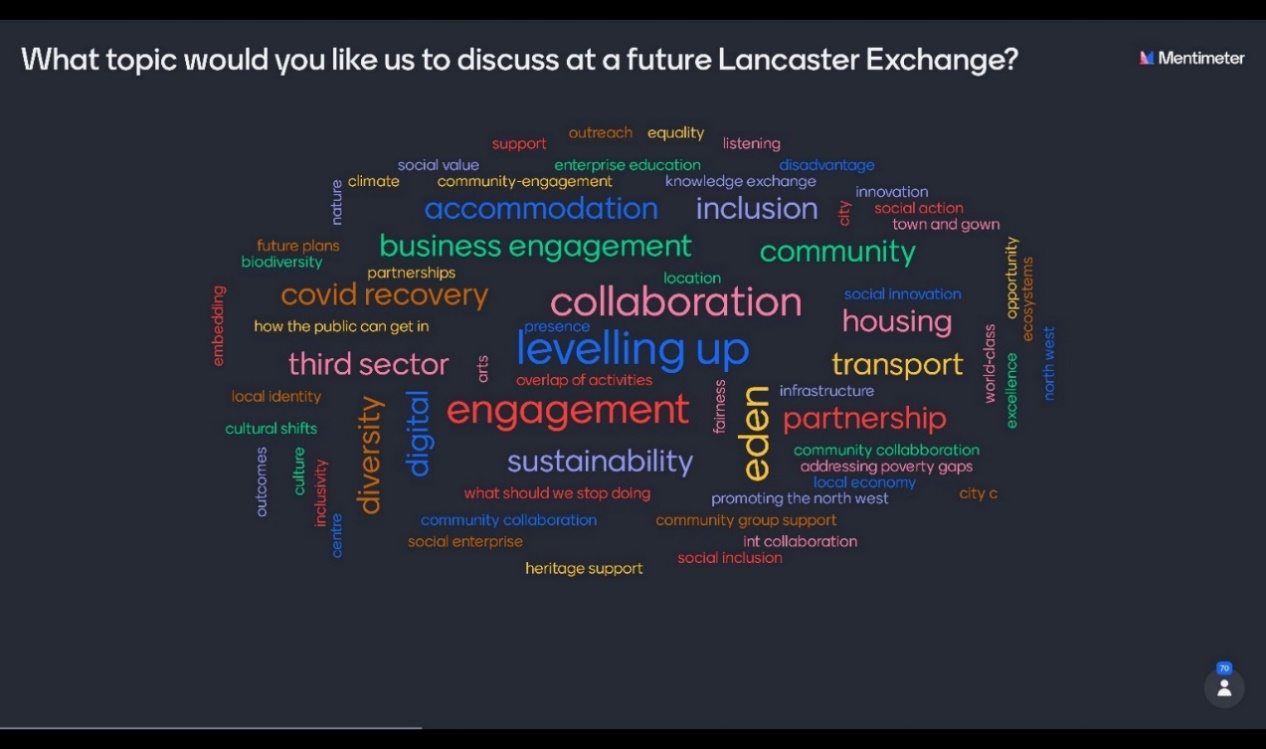
Caption: Feedback from 2021 Lancaster Exchange
There is a drive to promote a vibrant engagement culture within the University. ‘Big Conversations’ provide an engagement mechanism for important debate, and improved data capture is leading to stronger evidence for public and community engagement activities, knowledge exchange priorities, training and support needs.
Note You are currently viewing the latest version of this narrative statement. View the previous version as published in previous iterations of the KEF (KEF1 and KEF2)